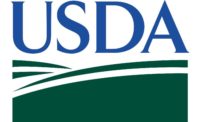In the letter, the NPPC asks the USDA to:
* Purchase immediately an additional $50 million of pork for various federal food programs – other than ones in USDA’s Section 32 program – using fiscal 2009 funds. Fiscal 2009 ends Sept. 30. The funds would not come from USDA’s Section 32 program. (USDA annually buys pork for food programs; it bought $62.6 million worth in 2008, for example.)
* Urge Congress to lift a spending cap on the Section 32 program, and use $50 million of $300 million available to purchase pork for the program, which uses customs receipts to buy non-price-supported commodities for school lunch and other food programs.
* Buy on Oct. 1 a minimum of $50 million of pork, using fiscal 2010 funds. Fiscal 2010 begins Oct. 1. The purchase would be in addition to USDA’s annual buy.
* Use $100 million of the $1 billion appropriated for addressing the H1N1 virus for the swine industry. This would include $70 million for swine disease surveillance, $10 million for diagnostics and H1N1 vaccine development and$20 million for industry support.
* Work with the U.S. Trade Representative to open export markets to U.S. pork. Several countries, including China, continue to impose unwarranted bans on U.S. pork because of the H1N1 flu.
* Study the economic impact on the livestock industry of an expansion of corn-ethanol production and usage. The U.S. Environmental Protection Agency has proposed raising the cap on blending ethanol into gasoline to 15 percent from its current 10 percent.
“U.S. pork producers are in desperate straits right now, and they need a little help from USDA,” said NPPC President Don Butler. “The request NPPC has made today not only will help pork producers and Americans who benefit from government feeding programs but tens of thousands of mostly rural jobs supported by the U.S. pork industry.”
Source: National Pork Producers Council
Kraft recalls pizzas over soy allergen concerns
Kraft Foods Global Inc., a Medford, Wis., establishment, is recalling approximately 8,000 pounds of frozen pepperoni and sausage pizza products because they may contain an undeclared allergen, soy protein concentrate, the U.S. Department of Agriculture's Food Safety and Inspection Service (FSIS) announced.The product subject to recall is 17.2-ounce packages of "Kraft, Jack's Original, Sausage & Pepperoni Pizza, made with pork, chicken & beef," which may bear a "Tombstone Original 12 Pepperoni Pizza" label on the back of the product. Any products bearing a "Jack's" back label are not subject to the recall.
The frozen pepperoni and sausage pizza products are packaged on a cardboard disc and wrapped in clear plastic. These packages bear the product number "7192100519," a Julian lot code number "09320," and the USDA mark of inspection, with establishment number "EST. 2461" ink-jetted on a white paper label on the back of the product.
The products were produced on July 19, 2009, and distributed to retail establishments in Illinois, Indiana, Iowa, Kansas, Kentucky, Michigan, Minnesota, Missouri, Montana, Nebraska, North Dakota, Ohio, Oklahoma, South Dakota, Tennessee, Washington and Wisconsin.
The problem was discovered by the company. FSIS has received no reports of adverse reactions due to consumption of this product.
Source: FSIS
New Jersey company recalls 128 pounds of ground beef
Pasha Halal Poultry, doing business as Marcacci Meats, a Vineland, N.J., establishment, is recalling approximately 128 pounds of ground beef products that may be contaminated with E. coli O157:H7, the U.S. Department of Agriculture's Food Safety and Inspection Service (FSIS) announced.The products subject to recall include various sizes of plastic-wrapped packages of "Marcacci Meats, Ground Beef." and 10-pound boxes of "Marcacci Meats, Ground Beef." These ground beef products were produced on Aug. 12, 2009, and were distributed to a consumer at the wholesale level in the Atlantic City, N.J., area, and packaged for sale to consumers at the retail level in Vineland, N.J. The problem was discovered by FSIS during microbiological sampling. FSIS has received no reports of illnesses associated with consumption of these products.
Source: FSIS
Drought may force Argentina to import beef
For the first time in two years, Argentina may have to begin importing beef as a drought has killed off cattle herds and export controls have caused ranchers to quit the business. The country's hard has decreased by 7 percent in size since 2006, according to Bloomberg reports, when the government restricted beef exports to boost supplies in the local market.As a result of the drought, many pastures have dried up, and forage prices are so high that ranchers are letting their cattle die in the fields, reported Arturo Llavallol, director of The Rural Society. He called for an end to the export restrictions, which would allow ranchers to get better prices and stop selling off their breeding stock for slaughter.
“If we want to keep exporting, we have to lower consumption,” said Llavallol, also the vice president of the Paris-based International Meat Secretariat, an association that represents ranchers worldwide. “If you don’t have enough raw materials, you shut down the factory or you import.” Argentina is the world's most beef-consuming nation.
Source: Bloomberg



